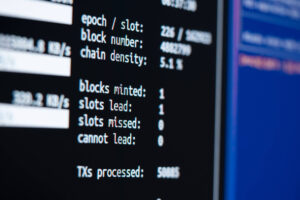Delegated Byzantine Fault Tolerance (dBFT) is a consensus algorithm used in certain blockchain networks to validate transactions and add new blocks.
This algorithm is a variation of the Byzantine Fault Tolerance (BFT) algorithm and is designed to protect networks against so-called "Byzantine faults".
A Byzantine fault occurs when a node in a network sends erroneous or misleading information to other nodes. In a blockchain network, this could lead to the validation of false transactions or the addition of fraudulent blocks to the blockchain.
In a dBFT system, special nodes, known as "delegates" or "speakers", are elected to validate transactions and add blocks to the blockchain. The delegates are elected by the rest of the network participants, known as "shareholders". Each shareholder can cast a vote, and the delegates with the most votes are given the responsibility to secure the network.
Unlike Proof-of-Work (PoW) and Proof-of-Stake (PoS) systems, which follow a competitive approach to transaction validation, delegates in a dBFT system collaborate to achieve consensus. This cooperative approach can lead to faster transaction times and greater scalability.
However, like other consensus mechanisms, dBFT - Delegated Byzantine Fault Tolerance has its own challenges. One of them is the risk of centralization, as the power to validate transactions lies in the hands of a few delegates. Furthermore, the system can be susceptible to Sybil attacks, where an attacker creates multiple identities to manipulate the voting process.
In summary, Delegated Byzantine Fault Tolerance offers a robust method for achieving consensus in blockchain networks but also comes with challenges related to centralization and security. It is a balance between efficiency and security that is critical for the sustainable development of blockchain technology.









